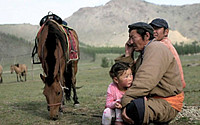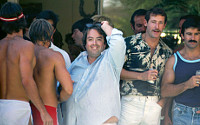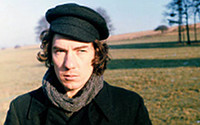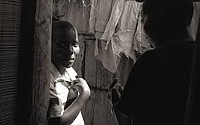| SHADOWS ON THE WALL | REVIEWS | NEWS | FESTIVAL | AWARDS | Q&A | ABOUT | TALKBACK | ||
 Shadows off the beaten path Shadows off the beaten path | ||
| Indies, foreigns, docs, revivals and shorts... | ||
|
On this page:
ALL THE WILD HORSES |
THE FABULOUS ALLAN CARR McKELLEN: PLAYING THE PART | SIDNEY & FRIENDS < < D O C S > > last update 5.Jun.18 See also: SHADOWS FILM FESTIVAL | ||
 R E V I E W B Y R I C H C L I N E
R E V I E W B Y R I C H C L I N E | ||
All the Wild Horses
| ||
|
dir-scr Ivo Marloh prd Ivo Marloh, Darcia Martin with Kate Willings, Maggie Pattinson, Deborah Swann, Monde Kanyana, Donie Fahy, Richard Killoran, Devan Horn, Ben de Rivaz, Linda Sandvik, Will Grant, Julie Youngblood, Ronald Van Der Velden  release US Oct.17 hsdff,
release US Oct.17 hsdff, UK 8.Jun.18 17/UK 1h29 |
 Gorgeously shot and assembled, this documentary captures the endless desert and mountains of Mongolia's steppe as well as its world-conquering expertise at horsemanship. Today, this is expressed in the Mongol Derby, the world's longest horse race. In documenting this event, filmmaker Ivo Marloh rode this race twice himself. So he knows a thing or two about endurance, and the film is seriously inspiring.
Gorgeously shot and assembled, this documentary captures the endless desert and mountains of Mongolia's steppe as well as its world-conquering expertise at horsemanship. Today, this is expressed in the Mongol Derby, the world's longest horse race. In documenting this event, filmmaker Ivo Marloh rode this race twice himself. So he knows a thing or two about endurance, and the film is seriously inspiring.
During the derby, riders from around the world race 1,000 kilometres. Since they swap Mongolian horses at a series of stations along the way, mimicking the ancient postal system, this involves a vast herd of horses raised and cared for by people all over the country. It's a dangerous event, and the first injuries take place only 11 minutes after it starts. The early leader is Horn, a keen rider from Houston, but others think she is underestimating the challenge in front of her. While much of this doc is a straightforward narrative of the race, the filmmakers capture local culture through the riders' eyes as they traverse the mountainous countryside. This includes 6-year-old local boys who show off their jockeying skills and areas where vicious dogs will kill a rider if he or she falls off. Thankfully, wild camels are less threatening. As they use GPS to navigate the route, and to allow the organisers to keep track of them, there are rules that require riders to pay attention to the condition of their horses or face penalties. The filmmakers follow more than 20 contestants, including multiple riders from the US, Britain and South Africa, plus Irish jockey colleagues Fahy and Killoran. Black South African Kanyana is a novelty in this corner of the world, and on the last day he has to tame a filly that has never been ridden. Of course, the horses have strong personalities too, including a particularly feisty one that's nicknamed Black Stallion. There are astonishing moments all along the way. The cinematography (by Michael Sanderson and director Marloh) is simply spectacular, capturing both the expansive landscapes and telling details about the competitors, their horses, the officials and the locals they encounter along the way, some of whom offer shelter for a night to these intrepid foreigners. With a series of intense challenges along the way, those who are unable to complete the race vow to be back another year. And with such a nail-biting finish line, the film almost makes us want to give it a go. | |
|
15 themes, language 23.May.18
| | |
 R E V I E W B Y R I C H C L I N E
R E V I E W B Y R I C H C L I N E | ||
The Fabulous Allan Carr

| ||
|
dir Jeffrey Schwarz prd John Boccardo, Jeffrey Schwarz with Allan Carr, Steve Guttenberg, Valerie Perrine, Maxwell Caulfield, Lorna Luft, Marlo Thomas, Alana Stewart, Eileen Bowman, Connie Stevens, Paul Sand, Sherry Lansing, Bruce Vilanch  release US 5.Jun.18 17/US 1h30 |
 A star-studded documentary about the colourful Hollywood producer behind Grease and Can't Stop the Music, this is a fast-paced celebration not only of Alan Carr's life but also of show business itself. Carr's career is notable for its huge successes and notorious flops, but his work stands the test of time: he was a great entertainer who loved making audiences happy.
A star-studded documentary about the colourful Hollywood producer behind Grease and Can't Stop the Music, this is a fast-paced celebration not only of Alan Carr's life but also of show business itself. Carr's career is notable for its huge successes and notorious flops, but his work stands the test of time: he was a great entertainer who loved making audiences happy.
Born in Chicago, Carr was obsessed with musicals and movies, so headed to Los Angeles. As talent coordinator on Hugh Hefner's Playboy's Penthouse, he worked his way into the industry. He helped Ann-Margret manage her movie career and made his first fortune releasing the 1976 Mexican exploitation film Survive, then began throwing huge parties to extend his influence. And he spun Grease into the biggest movie musical the world had ever seen, becoming a star himself. He was also flamboyantly gay, but never acknowledged it publicly. Narrated by Carr himself using interview excerpts, the film is a fantastic collection of movie and TV clips, old photos and animated re-enactments. The approach catches Carr's jovial attitude, while also exploring his struggles with overeating, which left him overweight and lonely. At the same time, he was considered the caftan-wearing "grand poobah" of the gay scene, throwing lavish parties for beautiful young men, for whom he was a loyal friend. The film vividly captures his boundless enthusiasm, which was often cocaine-fuelled. Carr's milestones are many. He devised the first year-end release for Oscar consideration (for The Deer Hunter in 1978), something now industry standard. When he first saw the Village People. he instantly came up with a movie for them to star in (1980's Can't Stop the Music may have been a box office dud but remains one of the most entertainingly bonkers movies of all time). He also discovered Michelle Pfeiffer and put her in Grease 2 (1982), another bomb. So he returned to the theatre, bringing La Cage Aux Folles from Paris to Broadway, where it became a monster Tony-winning hit. And then there was his notorious production of the Oscar ceremony in 1989, opening with that jaw-dropping number featuring Rob Lowe and Snow White singing Proud Mary. But another if his ideas stuck: instead of "and the winner is..." he changed it to "and the Oscar goes to...." In other words, his impact on the industry is indisputable. Carr's rollercoaster career isn't terribly unusual, but it's beautifully recounted with intelligence, wit and heart. So his death at 62 from cancer feels like a tragedy. | |
|
15 themes, language 20.May.18 | ||
 R E V I E W B Y R I C H C L I N E
R E V I E W B Y R I C H C L I N E | ||
McKellen: Playing the Part

| ||
|
dir Joe Stephenson prd Lene Bausager, Mark Birmingham, Sophia Gibber with Ian McKellen, Milo Parker, Scott Chambers, Luke Evans, Frances Barber, Adam Brown, Penny Clapcott, Judi Dench, Patrick Stewart, Maggie Smith  release UK 1.Jun.18
release UK 1.Jun.1818/UK 1h36 |
 Accompanied by an astonishing array of snapshots and footage, this documentary centres around an extended interview as a relaxed and expressive Ian McKellen speaks about his life, experiences and feelings. As a documentary, this may feel rather dry for non-fans. But there's a lot of terrific material in here that makes it an important exploration of the acting profession, which he sees as as vocation, like being a teacher or preacher.
Accompanied by an astonishing array of snapshots and footage, this documentary centres around an extended interview as a relaxed and expressive Ian McKellen speaks about his life, experiences and feelings. As a documentary, this may feel rather dry for non-fans. But there's a lot of terrific material in here that makes it an important exploration of the acting profession, which he sees as as vocation, like being a teacher or preacher.
Growing up in Wigan, McKellen spent his childhood watching people. He loved entertaining people with little performances, so as his friends found girlfriends, he gave himself to the theatre. He knew he was different, but no one spoke about sexuality at the time, and he had an outlet on stage to express his emotions. Moving into professional acting felt like a dream to him, playing a variety of roles and befriending experienced performers. Stardom in both theatre, film and television followed, almost accidentally. Indeed, McKellen refused to play the fame game, never plotting out his career to earn money. The film traces his life chronologically, interspersing archival material and interview clips with dramatised sequences, shot in stylish black and white and featuring his previous costars Parker and Chambers as younger versions of himself. The film is beautifully edited to give the narrative a lyrical flow, and the footage of his early performances is fantastic, as are backstage clips from film sets. He laughs that doing interviews are kind of ridiculous for an actor. Should be be himself or who the audience wants him to be? So he decides to treat them as a role. And this isn't something new for him, as he remembers using a different accent at school than he had at home. He also developed lifelong relationships with colleagues like the always playful Judi Dench and Patrick Stewart. And he discusses the challenges of working in big movie franchises later in life, namely X-Men and Lord of the Rings. In addition to a careful retelling of McKellen's life, the film is a fascinating look at the world over the past half-century. Coming out in the late 1970s was groundbreaking for a top actor, but he was compelled to take a stand against harsh new government restrictions. And he has carried on as an activist ever since. The doc also recalls a simpler age when people became famous because of their accomplishments, rather than striving for fame as a goal in itself. He simply prefers the childishness of the career, the act of saying, "Let's pretend!" | |
|
12 themes, language 13.May.18
| | |
 R E V I E W B Y R I C H C L I N E
R E V I E W B Y R I C H C L I N E | ||
Sidney & Friends
 MUST
MUST  SEE SEE
| ||
|
dir-prd Tristan Aitchison with Sidney, Guillit, Ben, Maria, Leone, Lexy voices Michael Daviot, Awuor Onyango, Charles Ouda  release UK Mar.18 flare 18/UK 1h15 
|  Shot over several years, this extraordinary documentary explores a segment of Kenyan society that's virtually invisible, mainly because it wouldn't be safe for these people to be out in the open. Scottish filmmaker Tristan Aitchison gets sometimes startling access to this community, revealing the day-to-day issues in their lives. The film is beautifully assembled in an introspective way that draws the audience in and challenges our perceptions.
Shot over several years, this extraordinary documentary explores a segment of Kenyan society that's virtually invisible, mainly because it wouldn't be safe for these people to be out in the open. Scottish filmmaker Tristan Aitchison gets sometimes startling access to this community, revealing the day-to-day issues in their lives. The film is beautifully assembled in an introspective way that draws the audience in and challenges our perceptions.
In a Nairobi shantytown, Sidney is a remarkable young man who speaks openly about his childhood, raised as a girl even though he was born with both genders (he had a child with his teen girlfriend). He desperately wants to maintain his relationship with his parents, but they throw him out of the house for dressing as a boy. So he runs to Nairobi, where he meets Guillit, a trans man who is a sort of papa bear for trans and intersex young people who have no support system and are unable to find work or health care since their ID cards list the wrong gender. These are articulate people with big personalities, likeable and tenacious, and they just want normal lives. But the deeply religious culture tells them they have to change who they are and assume roles that feel alien (Sidney's family believes he is demon-possessed). So most of them look for hope abroad, although Sidney and his partner Ben have chosen to stay in Kenya to raise awareness for their cause, even if speaking openly is perilous in a society terrified of anyone who's different. It's remarkable that that Aitchison was able to shoot this material. Filming guerrilla style, he keeps the focus tightly on these six lively young people. The material is assembled artfully in black and white with poetic asides. Voice actors recreate various pivotal situations, and black screens are used provocatively as the most harrowing events are recounted, allowing the audience's imagination to fill in the details in ways no visual imagery could. Indeed, these young people have been through some harrowing situations. What emerges is a telling exploration of the situation in Kenya, where it's not technically illegal to be gay or trans but people are heavily persecuted. And the film also helps define the difference between trans and intersex without any scientific explanations: we can see these people and understand what each is dealing with. Even further, Aitchison is recounting universal stories about the deeper yearning each of us has, regardless of the specifics of our situation: either everyone has the right to life, liberty and the pursuit of happiness, or no one does. | |
|
15 themes, language 25.Mar.18 | ||


See also: SHADOWS FILM FESTIVAL © 2018 by Rich Cline, Shadows
on the Wall
| ||